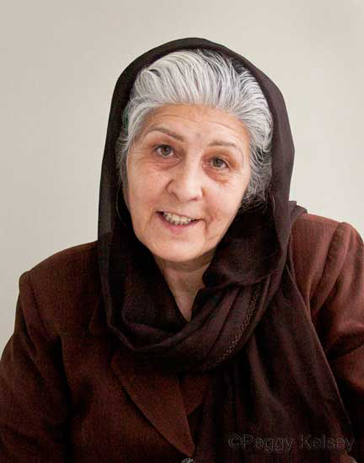
Tajwar
(Read the original post about Tajwar.)
Our population is more than men but every time they keep putting down strong women. They don’t give a chance to women. They’re afraid of those women. They give the job to that woman so she will be in their pocket. I am a women and I am Afghan. This country belongs to me and I belong to the country and these are my people. Read More
About Tajwar
The daughter of the leader of the Pashtun Kakar clan and married at 14 as a second wife to an Uzbek man, she had a very difficult time in this family of a different culture and language. Nevertheless, in spite of her tremendous household responsibilities and the children she began bearing, she finished high school, teacher training became a teacher and then a school director. When the Russians invaded, she became the first leader of the women “freedom fighters”, often sneaking off to different villages to meet with her colleagues. Eventually, she was captured by the Russians, tortured and held for a year. After her release she continued her work and had numerous narrow escapes, including having to leave for Kabul on foot with her husband and 7 children, 8 days after the birth of her youngest. After numerous death threats, they escaped to Pakistan and later to Australia. An ardent spokeswoman for women’s rights, Tajwar called a successful strike (via VOA and BBC radio) for Afghan women to stop supporting their men if they weren’t being treated right. She also established schools for children in the Pakistan refugee camps for the International Relief Committee (IRC).
In 2000 she went back to Afghanistan. During talks with senior Taliban leaders she convinced them to let her open Hope School. (The girls’ school part of her proposal was agreed to but never implemented, mostly due to lack of support from the western aid organization that had promised the funding.) She worked at the school as director until it was mistakenly bombed by U.S. forces in 2001. She rebuilt the school, but it was taken from her when she was out of the country. She says: “when I was, in Bonn, Germany at a conference with NGOs from all over Afghanistan, I asked them how much money did you give Afghanistan? Who did you give it to, and for what? You are losing your money. When I came back here they took my school from me.” Currently, she is living alone in Kabul. She sent her youngest son back to Australia after he survived a second assassination attempt. She now works in the Parliament for Afghanistan Parliament Assistance Project doing capacity building. She ran for Parliament in September, 2010.
What do you think about the conditions of Afghanistan compared to 2003 when I saw you last?
If you’re thinking about capacity building it is very good. For example women have become members of Parliament, and some women have positions in the Ministry. Many girls go to school and there are a lot of private schools and private universities. Girls have freedom to walk in the street. However from 2003, security has gotten very bad.
When the mujahidin got power (after the Soviets left) why didn’t they rebuild Afghanistan? Why were they fighting? Why did they destroy Kabul? Now those same men are in the government. But there is one change I saw. Now they are talking very nicely but their mind is the same. Now they don’t have long beards and Kalashnikovs. They are wearing a suit and tie, but their thinking is the same. That is the danger of the Taliban because they will tell you “I want Islam like this”, but now everything they are telling me I like. It’s just another face.
Today I talked with two men and asked them why they’re running for parliament now and not next time? He said. “Being in parliament is good for our safety. If I’m free, I will go to jail or somebody would kill me. It’s better that I’m in parliament.” You know, if some people are coming for this idea, and the parliament is for them and for their security, what will happen to the people? Everybody in parliament is fighting and not much work gets done. Nobody can stop the war because they’re not working for Afghanistan, they’re working for their own interests.
« back to Portraits & Stories list